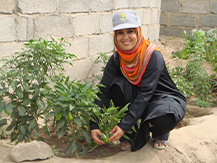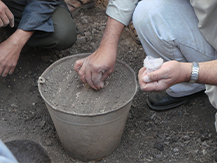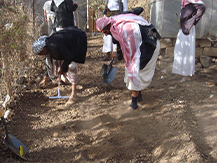
Home-Gardens
Home-gardens cover small areas besides the houses. They are cultivated with various vegetables, fruit trees or cosmetic/odorant plants, and irrigated in a traditional way. They are fenced with natural materials as a protection. They contribute to food security and income generation of concerned families. Gardens can also cover up to 14% of average daily food expenses as well as 22% of the average daily family income. The important point is that home-gardens can constitute up to 50% of the incomes of the most deprived populations. They are also useful to complement family’s diet not only regarding quantities but also diversity as a good supplier of Vitamin A or C, Calcium or Iron. This is important for women and children who also play an essential role in managing and cultivating these gardens. In poor rural areas, the utilization of these gardens enhances self-subsistence or increases family’s income thanks to production marketing.
In collaboration with other projects, doners, national and international NGOs Al-Thuraya conducts studies, training and capacity building to:
- Recommendations on the technical choice and procurement of agriculture inputs such as.
- Kinds of agriculture inputs (with detailed technical specificities) to be distributed to targeted beneficiaries taking into account the objective and expected outcomes of the different designed projects and the local context, including:
• the type of seeds (including variety, purity…).
• the type of organic fertilizers if needed.
• the type of tools.
• (no pesticides, no chemical fertilizers) will recommend by Al-Thuraya for home gardening.
- Providing recommendations on:
• Selection criteria to be applied for the identification and validation of suppliers.
• Procedures to be applied for the verification of the quality of agriculture inputs (germination test - variety/purity verification)
- Technical follow-up/monitoring of the beneficiaries:
• Establish a beneficiaries technical follow-up plan.
• Train on the follow-up of activities.
• Conduct joint follow-up visits with extension agents.
- Follow-up of the extension agents by expert supervisor.













